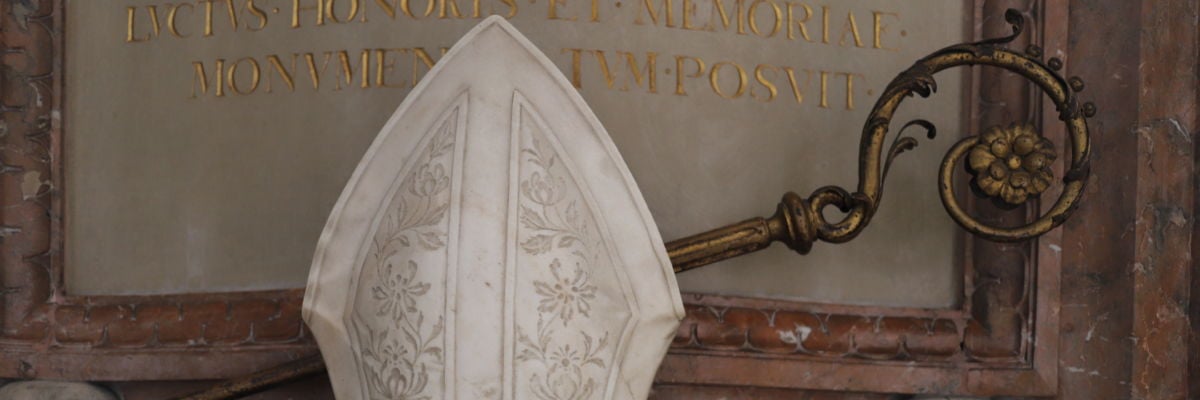
Episode 30: Year A – 11th Sunday of Ordinary Time
In this episode of the Sunday Catholic Word, we focus on two details that are relevant to doing apologetics. The first comes from the first reading, taken from Exodus 19:2-6a, and is relevant to discussions about the New Covenant ministerial priesthood. The second detail is found in the Gospel reading, which is taken from Matthew 9:36-10:8. The apologetical topic that it relates to is the Papacy.
Looking for Sunday Catholic Word Merchandise? Look no further! https://shop.catholic.com/catholic-answers-merchandise/?q=sunday
Hey everyone,
Welcome to The Sunday Catholic Word, a podcast where we reflect on the upcoming Sunday Mass readings and pick out the details that are relevant for explaining and defending our Catholic faith.
I’m Karlo Broussard, staff apologist and speaker for Catholic Answers, and the host for this podcast.
In this episode, we’re going to focus on two details that are relevant to doing apologetics. The first comes from the first reading, taken from Exodus 19:2-6a. It’s a detail that comes up in discussions about the New Covenant ministerial priesthood. The second detail is found in the Gospel reading, which is taken from Matthew 9:36-10:8. The relevant topic for that detail is the Papacy.
Let’s start with the detail from the first reading. The relevant passage recounts Moses’s conversation with God up on Mount Sinai. In verses 5-6, God tells Moses, “[I]f you hearken to my voice and keep my covenant, you shall be my special possession, dearer to me than all other people, though all the earth is mine. You shall be to me a kingdom of priests, a holy nation.” The part that I want to focus on for our purposes is “you shall to be me a kingdom of priests, a holy nation.”
This text comes up in apologetical discussions concerning the priesthood. And it does so in a few different ways.
First, it comes up in our response to some Protestants who object to the idea that there exists a ministerial or hierarchical priesthood in the New Covenant based on the idea that Christ is our one high priest, which the author of Hebrews teaches in Hebrews 3:1. If Christ as our high priest negates having any other priests, then we’d have to reject St. Peter’s teaching in 1 Peter 2:9 that we Christians are a “royal priesthood.” Here is where our text from Exodus 19:6 comes into play. In calling the Christian people a “royal priesthood” (which is the same as saying we are a kingdom of priests), St. Peter clearly is alluding to Exodus 19:6, and thereby revealing that the Christian people is the New Israel of God.
The second way this text from Exodus 19:6 comes up is when Protestants appeal to 1 Peter 2:9 as evidence that there is no ministerial or hierarchical priesthood. “There’s no ministerial priesthood,” so it’s argued, “because St. Peter says we’re all priests.”
But wait a minute. Peter is quoting Exodus 19:6, which refers to the Israel of God in the Old Covenant as a “kingdom of priests.” Didn’t they have a ministerial priesthood? They did! Aaron and his sons— Nadab, Abihu, Eleazar, and Ithamar, who served with Aaron (see Exodus 28 and Leviticus 8). The Levitical priests would even come about later in Exodus 32.
So, just because there exists a universal priesthood of believers in Christ, like Israelites according to Exodus 19:6, it doesn’t follow that there is no ministerial priesthood.
A third way that Exodus 19:6 comes up in these sorts of discussions about the ministerial priesthood is that it provides for us positive evidence for the existence of a ministerial priesthood in the New Covenant. This is something that we’ve had opportunity to reflect upon a few Sundays in the past, but let’s go over again here.
Recall, the universal priesthood of the Israelites was merely one rank (the lowest rank) of priestly status among two others: the top level of Aaron the high priest, and the middle level, which comprised his sons, Nadab, Abihu, Eleazar, and Ithamar, who served with Aaron (see Exodus 28 and Leviticus 8).
When we look in the New Testament, we discover a top level there, too: Jesus, our high priest (Heb. 3:1). We’ve already seen that the bottom rank consists of the body of Christian believers (1 Pet. 2:9), in a parallel with the universal priesthood of the Israelites. It makes biblical sense, therefore, for there also to be a New Testament parallel to the middle rank: ministers specially ordained to serve the people with Jesus just as Aaron’s sons served with him. So, Exodus 19:6, and Peter’s allusion to it, actually strengthens the Catholic position. For more evidence on the New Testament ministerial priesthood, I’d recommend you check out my book Meeting the Protestant Challenge. I have a chapter in there where I deal specifically with this issue.
Now we can turn to the Gospel reading, again, which is taken from Matthew 9:36-10:8. The key verse that I want to briefly focus on is Matthew’s listing of the apostles with Peter as “the first.” He writes, “The names of the twelve apostles are these: first, Simon called Peter.”
The Greek word used here, protos, can be used either to connote a chronological order or to suggest a primacy of place, like “first and foremost,” or “most prominent.”[i]
It doesn’t seem that Matthew is using protos in a chronological sense. He can’t be using it to refer to the chronological order of the apostles’ calling because Andrew was called first, not Peter, according to John 1:42. Nor can he be using it to refer to an order in a list, since he doesn’t speak of a “second,” “third,” etc. Therefore, Matthew must intend protos to refer to Peter having a primacy of place among the twelve, the “first and foremost,” or “most prominent” apostle.
This interpretation is further strengthened by the fact that only Matthew records Jesus’ promise to build His Church upon Peter, the rock, and to give Peter the keys of His kingdom. That Peter is the foundation of Jesus’ visible Church jibes with Matthew intending Peter to be “first” in the sense of “most prominent” or the “chief.”
So, the Gospel reading for this upcoming Sunday Mass gives us an opportunity to reflect on Peter as the first pope.
Conclusion
Well, my friends, that does it for this episode of the Sunday Catholic Word. This upcoming Sunday Mass readings for the 11th Sunday of Ordinary Time, Year A gives us an opportunity t o reflect on two apologetical topics:
- The New Covenant ministerial priesthood, and
- The papacy
I hope what I’ve shared here can help you in your conversations.
Thank you so much for subscribing to the podcast. Please be sure to tell your friends about it and invite them to subscribe as well. Also, if you’re interested in getting some cool mugs and stickers with my logo, “Mr. Sunday podcast,” go to shop.catholic.com.
I hope you have a blessed 11th Sunday of Ordinary Time. God Bless!
[i] Barclay M. Newman, A Concise Greek-English dictionary of the New Testament, 156.



